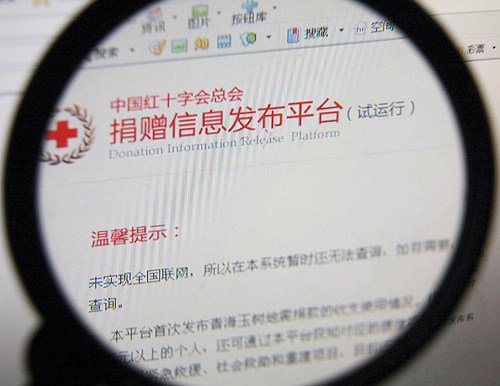|
 |
|
GREATER TRANSPARENCY: In response to corruption scandals, the Red Cross Society of China has taken the first step toward improving its transparency (XINHUA) |
Charity Transparency
On July 31, the Red Cross Society of China (RCSC) launched its online information platform in a test run. Through this platform, people are able to check information about donations to the organization backdated to January 11 this year. Transparency is the foundation of a charitable organization's credit. It's good the RCSC has finally set up this platform. It shows the organization is moving in the right direction.
But, obviously, there is much scope for improvement for the platform. First, this platform is expected to present all the details of every donation—from where it comes and how it is spent. The current information platform lags far behind in this requirement.
Second, how the donations are used. The RCSC has announced charity programs, but there is no detailed budget or expenditure list. How the donations are used or if they are wasted or embezzled is still unclear to the public. Therefore, the RCSC needs to work out a detailed list, exhibiting the spending detail of every program. For example, when a donation goes to building a school, the RCSC needs to list every item of expenditure on the construction, such as workers employed, bricks and cement or steel purchased.
The RCSC might confront many difficulties in improving its work, but charity organizations' survival depends on public donations. It is its duty to make budgets transparent. "Charity competition" is now going on in China. If the public does not even believe their donations to a certain organization will be properly used, how can you persuade them to continue to donate to the organization rather than others?
The RCSC needs to listen to advice from all walks of life and develop this information platform into a transparent and credible charity window.
The Beijing News
Fancy Signs
Expensive new road signs in Nanjing, capital of east China's Jiangsu Province, have recently become a heated topic among local residents. The local government plans to standardize road signs on the city's streets within three years. Until now, 326 new street signs have been installed, costing 980,000 yuan ($151,000). Nanjing has 7,265 streets and roads, which means it needs 30,792 standard street signs, at a cost of around 100 million yuan ($15.4 million).
Last week, the local government announced it is to invest a huge amount of money to paint all of the city's roofs red, to make the city more beautiful when seen from the sky. Ironically, several recent storms easily changed the whole city into a sea. The public can't help sighing: Why not spend these two huge sums improving the water drainage system?
For some people, the rainy season is only a short period. No matter how well the sewer system is managed, no one sees it, but unified street signs and red roofs are striking images of the city.
Sewer systems are regarded as a city's conscience. It's not all about sewers, but about every piece of infrastructure and construction, especially shiny facilities in prominent urban areas. In this sense, fancy street signs degrade the city's conscience, rather than improving its image.
Guangzhou Daily
Discriminatory Fee Charges
Since 2004, Guangzhou, capital city of south China's Guangdong Province, has charged a fee for public security to the city's migrant population, 2.5 yuan ($0.38) a month per person, but recently the municipal government decided to abolish this discriminatory charge after seven years of debate.
The fee is ridiculous. Who is supposed to be responsible for this city's safety? It is the police, who are paid by the government. This is therefore obviously a duplicated fee charge. The most illogical thing about this fee charge is, why have migrant workers been made its target? What kind of insecure factors are there among these working people?
In a sense, the fee is not only a discriminatory label on the migrant population, but this group is automatically categorized as unstable, adding to their living costs in big cities.
It is just one of the many selective and discriminatory fee charges in today's China. Throughout the country, various certificates and related fee charges migrant workers are demanded to pay every year come to 5 billion yuan ($769.23 million). As a result, migrant workers are basically unlikely to achieve equal positions in urban life with urban residents. The sooner those unfair fees are cancelled, the better it is for social equality and harmony.
Yangzi Evening News
Overloading Fee
In Anyang, central China's Henan Province, local road authorities previously allowed overloaded trucks to pass—regardless of their weight—as long as truck drivers paid a certain monthly fee. This practice continued until it was disclosed by the media. On July 30, the authorities announced punishments for the staff involved in the scandal.
Overloaded vehicles not only pose threats to others on the roads, but also damage roads and bridges, so it's very important for road authorities to strictly enforce the laws and regulations on overloaded vehicles to prevent accidents and infrastructure damage. In Anyang's case, ironically, law enforcement personnel were only interested in money while turning a blind eye to overloading. Instead of guarding road safety, they placed further economic burdens on drivers.
Although staff were punished after the media's revelation, it was not severe enough to deter future misbehavior. Effective regular punishment on law enforcement staff wrongdoing is necessary.
The fundamental way to avoid vehicle overloading is to cut transport cost. When there are so many tolls and various fees to pay on the way, drivers find they can't make money without overloading their trucks. More importantly, it is time to eradicate the opportunities for law enforcement personnel to charge fees illegally.
Workers' Daily | 